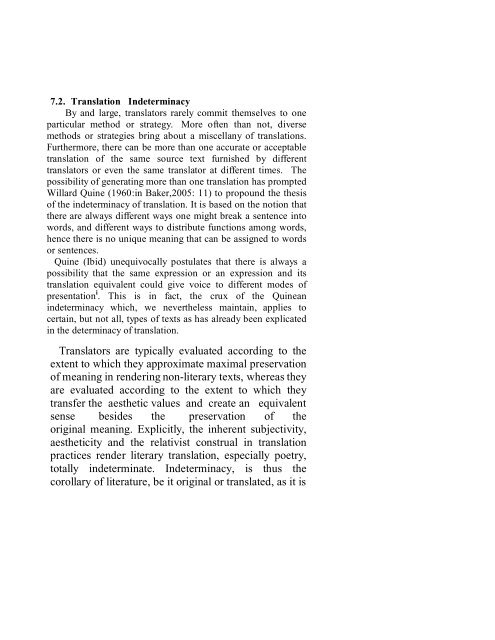424_2061_A.B.
424_2061_A.B.
424_2061_A.B.
- No tags were found...
You also want an ePaper? Increase the reach of your titles
YUMPU automatically turns print PDFs into web optimized ePapers that Google loves.
7.2. Translation IndeterminacyBy and large, translators rarely commit themselves to oneparticular method or strategy. More often than not, diversemethods or strategies bring about a miscellany of translations.Furthermore, there can be more than one accurate or acceptabletranslation of the same source text furnished by differenttranslators or even the same translator at different times. Thepossibility of generating more than one translation has promptedWillard Quine (1960:in Baker,2005: 11) to propound the thesisof the indeterminacy of translation. It is based on the notion thatthere are always different ways one might break a sentence intowords, and different ways to distribute functions among words,hence there is no unique meaning that can be assigned to wordsor sentences.Quine (Ibid) unequivocally postulates that there is always apossibility that the same expression or an expression and itstranslation equivalent could give voice to different modes ofpresentation i . This is in fact, the crux of the Quineanindeterminacy which, we nevertheless maintain, applies tocertain, but not all, types of texts as has already been explicatedin the determinacy of translation.Translators are typically evaluated according to theextent to which they approximate maximal preservationof meaning in rendering non-literary texts, whereas theyare evaluated according to the extent to which theytransfer the aesthetic values and create an equivalentsense besides the preservation of theoriginal meaning. Explicitly, the inherent subjectivity,aestheticity and the relativist construal in translationpractices render literary translation, especially poetry,totally indeterminate. Indeterminacy, is thus thecorollary of literature, be it original or translated, as it is
















